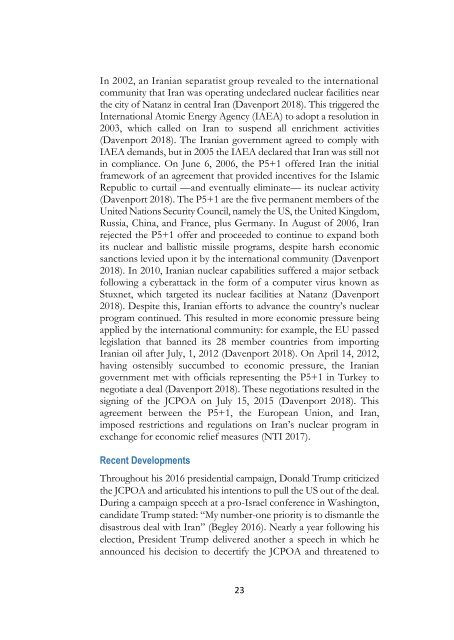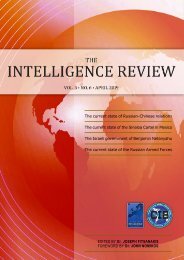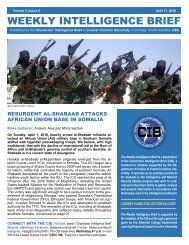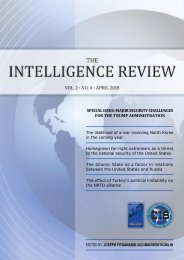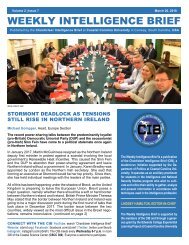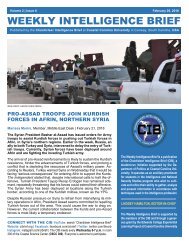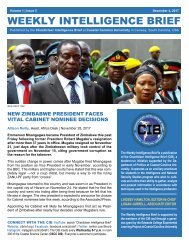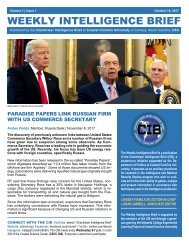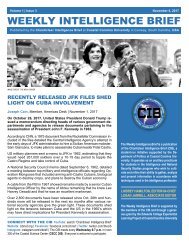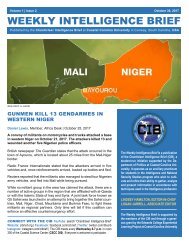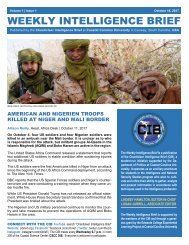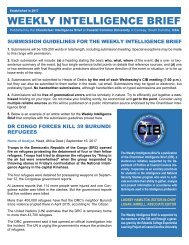The Intelligence Review | volume 3 | issue 5 |
This volume is the product of a collaboration between the European Intelligence Academy (EIA) and the Chanticleer Intelligence Brief (CIB), a pre-professional body supported by the Department of Politics at Coastal Carolina University in Conway, South Carolina, United States. Six CIB analysts tackle some of the most pressing and timely questions confronting intelligence observers today. Topics in this issue include the current and projected strength of the al-Shabaab militant group in East Africa, the future of the Iran nuclear agreement, and the current state of Mexico’s drug cartels. The issue also contains an analysis of the rising tension between the European Union and the government of Poland, as well as of the complex relationship between the United States and Cuba. The compendium concludes with an eye-opening report on the state of Middle Eastern linguistics in the United States Intelligence Community in the post-9/11 era.
This volume is the product of a collaboration between the European Intelligence Academy (EIA) and the Chanticleer Intelligence Brief (CIB), a pre-professional body supported by the Department of Politics at Coastal Carolina University in Conway, South Carolina, United States. Six CIB analysts tackle some of the most pressing and timely questions confronting intelligence observers today. Topics in this issue include the current and projected strength of the al-Shabaab militant group in East Africa, the future of the Iran nuclear agreement, and the current state of Mexico’s drug cartels. The issue also contains an analysis of the rising tension between the European Union and the government of Poland, as well as of the complex relationship between the United States and Cuba. The compendium concludes with an eye-opening report on the state of Middle Eastern linguistics in the United States Intelligence Community in the post-9/11 era.
Create successful ePaper yourself
Turn your PDF publications into a flip-book with our unique Google optimized e-Paper software.
In 2002, an Iranian separatist group revealed to the international<br />
community that Iran was operating undeclared nuclear facilities near<br />
the city of Natanz in central Iran (Davenport 2018). This triggered the<br />
International Atomic Energy Agency (IAEA) to adopt a resolution in<br />
2003, which called on Iran to suspend all enrichment activities<br />
(Davenport 2018). <strong>The</strong> Iranian government agreed to comply with<br />
IAEA demands, but in 2005 the IAEA declared that Iran was still not<br />
in compliance. On June 6, 2006, the P5+1 offered Iran the initial<br />
framework of an agreement that provided incentives for the Islamic<br />
Republic to curtail —and eventually eliminate— its nuclear activity<br />
(Davenport 2018). <strong>The</strong> P5+1 are the five permanent members of the<br />
United Nations Security Council, namely the US, the United Kingdom,<br />
Russia, China, and France, plus Germany. In August of 2006, Iran<br />
rejected the P5+1 offer and proceeded to continue to expand both<br />
its nuclear and ballistic missile programs, despite harsh economic<br />
sanctions levied upon it by the international community (Davenport<br />
2018). In 2010, Iranian nuclear capabilities suffered a major setback<br />
following a cyberattack in the form of a computer virus known as<br />
Stuxnet, which targeted its nuclear facilities at Natanz (Davenport<br />
2018). Despite this, Iranian efforts to advance the country’s nuclear<br />
program continued. This resulted in more economic pressure being<br />
applied by the international community: for example, the EU passed<br />
legislation that banned its 28 member countries from importing<br />
Iranian oil after July, 1, 2012 (Davenport 2018). On April 14, 2012,<br />
having ostensibly succumbed to economic pressure, the Iranian<br />
government met with officials representing the P5+1 in Turkey to<br />
negotiate a deal (Davenport 2018). <strong>The</strong>se negotiations resulted in the<br />
signing of the JCPOA on July 15, 2015 (Davenport 2018). This<br />
agreement between the P5+1, the European Union, and Iran,<br />
imposed restrictions and regulations on Iran’s nuclear program in<br />
exchange for economic relief measures (NTI 2017).<br />
Recent Developments<br />
Throughout his 2016 presidential campaign, Donald Trump criticized<br />
the JCPOA and articulated his intentions to pull the US out of the deal.<br />
During a campaign speech at a pro-Israel conference in Washington,<br />
candidate Trump stated: “My number-one priority is to dismantle the<br />
disastrous deal with Iran” (Begley 2016). Nearly a year following his<br />
election, President Trump delivered another a speech in which he<br />
announced his decision to decertify the JCPOA and threatened to<br />
23


